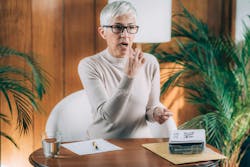With a fresh wave of free COVID-19 rapid tests now shipping to households nationwide, and many other types of at-home medical tests now available on store shelves and websites, a new study looks at what older adults think about this newfound ability to get answers to medical questions without leaving home.
The study, based on data from a survey of people between the ages of 50 and 80, asked about their experiences with and views about many types of at-home tests. It included questions about tests for cancer, infections, allergies, genetic traits and more -- both tests that give immediate results and those that get mailed in.
In general, 48% of older adults had bought at least one of these tests in the past, not counting free COVID-19 tests and other free tests, according to findings published in the journal Inquiry and based on data from the University of Michigan National Poll on Healthy Aging.
Almost all – 91% -- of those who had bought a test said they’d do it again in future. Nearly 80% of them saw at-home tests as more convenient than a conventional medical test, 60% called them trustworthy and 75% said they give good value for the money.
But even among older adults who hadn’t yet tried at-home testing at the time of the poll, 75% said they’d likely try one in the future, and 71% said they saw such tests as more convenient, though much lower percentages said they were trustworthy or a good value.
However, the data reveal some major disparities by education, income, race/ethnicity and gender. Such gaps may increase disparities in early detection of disease or risk, say the authors, who are current and former members of the U-M Institute for Healthcare Policy and Innovation where the poll is based.
Older adults who have a college degree or higher, or a household income over $100,000, were much more likely to have bought at least one at-home medical test than those in other education and income brackets, at 56% and 61%, respectively.
Those with college-level education were also much more likely to say such tests are more convenient than testing at a clinic, and that they’d likely buy some sort of at-home test in the future.
At the same time, 36% of Black older adults said they had bought at-home medical tests, compared with 46% to 53% of older adults who are white non-Hispanic, Hispanic, or members of other racial or ethnic groups.
As for interest in future use, 87% of women said they would likely buy at-home tests, compared with 76% of men. Nearly 89% of those with college education said they would, compared with 78% of those with high school education or less.
In addition to these disparities, lead author Joshua Rager, M.D., M.A., M.S., said the high percentage indicating they had bought a home DNA test for medical or ancestry-tracing reasons surprised him. Overall, 16% of older adults had done so. But 24% of those with college educations and 22% of those with incomes over $100,000 had.
The poll shows that while more than 90% of all older adults feel people should share their at-home test results with their clinical care team, the percentage who actually did so varied widely. In all, 91% of those who screened for cancer at home said they told their primary health care provider.
By comparison, 55% of those who took an at-home test for an infection other than COVID-19 did, and only 9% of those who ordered an at-home DNA test told their provider about the results.

